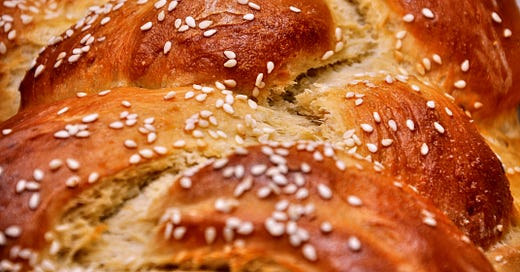Photo by shraga kopstein on Unsplash
MY LOVE FOR THE HEBREW LANGUAGE—learning it, rolling its sounds around deep in my throat, speaking it, decoding it—is not logical. It’s not tied to a love of Israel as a country (my feelings there are way more mixed) or to religion (I don’t believe in God). I’ve always known there was something much deeper going on, but never quite articulated it to myself.
Then I came across a poem I published 32 years ago, three years after my grandmother died, first in Prairie Schooner literary magazine and later in a chapbook of poems published by Parallel Press called The Promised Land. And there was my answer, buried or forgotten. I knew it 32 years ago and I know it now too. And now so do you.
CHALLAH
for Esther Evantash Brown
Dusk is falling in the kitchen
where the chicken’s soul rises
in steam, shimmers through
the slipped lid like perfume.
Flour and eggs, oil and sugar,
yeast to make it rise.
So many times we ate this meal
together, on Friday nights
I waited for all week.
Work in the flour with bare hands.
Now it’s been three years
since I’ve known where
I could find you, and the same
since I have written anything.
I can still hear the chop
the metal half-moon made
slicing through bloody livers
in a bowl, smell the fresh-
killed chicken baking
and the line of suds just
underneath your elbows,
your two hands plunged
into hot water, scouring.
Oil the dough, and give it time to rise.
You coaxed me up through
the long darkness where
I might have stayed.
Knead the raw dough
until its stickiness turns smooth.
I see you through a veil of smoke
and pale chiffon, your scarf
over my eyes while you light
the candles, gather the new flames
three times, hide your eyes,
and say the Hebrew words
I understand as love.
Punish the bread because it isn’t you.
In the language of fire
And smoke, the prayer
for grief is only for a son
or daughter, standing with others
in late afternoon, chanting the bell-
like syllables together.
There are no words
for granddaughters to mourn.
Divide the dough in threes
and make from each a line.
Squeeze them together
at one end and braid. This meal
I make and eat alone,
calling up sweetness
with each bite of bitterness,
shaping raw grief into
what it becomes—
something bloody and hot
and good, brief in the mouth,
a long time in the belly,
full of all the words I’ll ever need.




